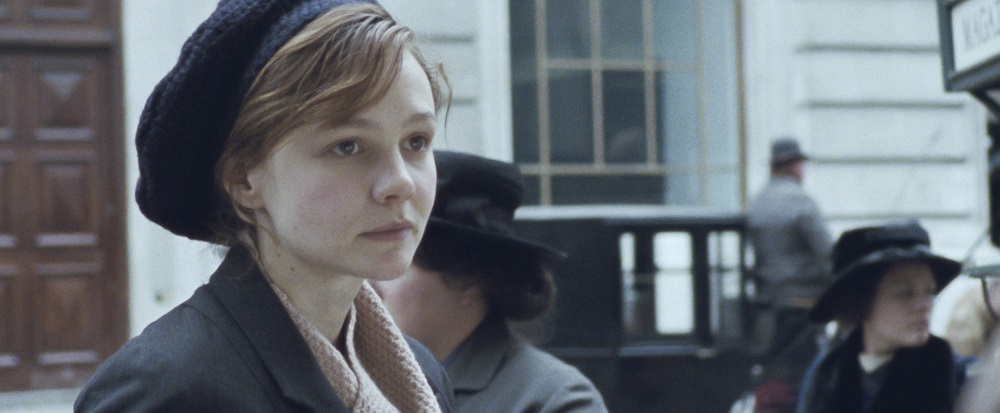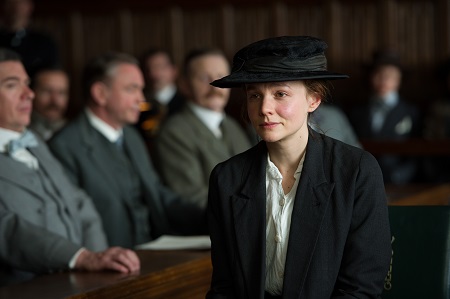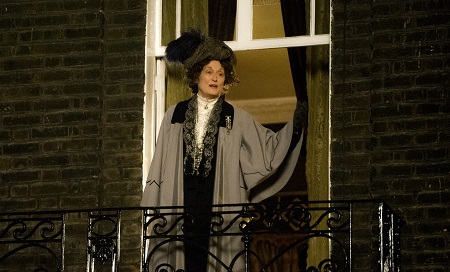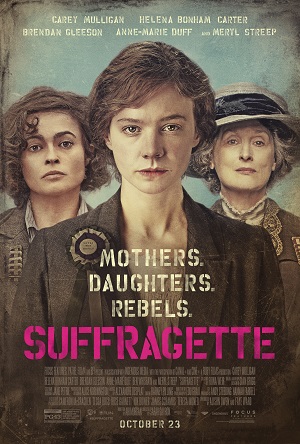
Mulligan Anchors Delicately Nuanced Suffragette Beautifully
In 1912, the Women’s Suffrage movement in Great Britain is losing steam. London-based Women’s Social and Political Union (WSPU) founder Emmeline Pankhurst (Meryl Streep) urges her followers to amplify their acts of civil disobedience, doing so in order to force the police to take increasingly militant action against them that will hopefully catch the eye of the press, Parliament, King George V as well as the general public at large. Pharmacist Edith Ellyn (Helena Bonham Carter) is a passionate follower who agrees with this decree, using her position of relative authority to quietly urge like-minded women to cause as much havoc as they comfortably can.
Working-class wife and mother Maud Watts (Carey Mulligan) has been working in the same laundry since she was a young child, her loving husband Sonny (Ben Whishaw) able to say the exact same thing. But while she has risen to a place of authority, he still makes more money than she does. On top of that, he isn’t the victim of all types of sexual advances and derogatory putdowns, and watching newcomer Violet Miller’s (Anne-Marie Duff) beautiful daughter Maggie (Grace Stottor) put up with similar advances is almost more than Maud can bear.
As far as contrivances go, writer Abi Morgan’s (Shame, The Invisible Woman) script for Suffragette is full of them. Not only is Violet a dedicated follower of Emmeline Pankhurst, but Maud’s trusted pharmacist just happens to be Edith Ellyn herself, so when the former starts to suggest that her new coworker might be interested about speaking about her time in the laundry, it’s the latter that makes the hard sell convincing her to do it. There are numerous additional coincidences, not the least of which take place during the film’s climax, and while I’m not about to ruin anything, let’s just say who it comes down to as far as catching the eye of the King is concerned is hardly surprising.
Be that as it may, the movie, directed by Sarah Gavron (Brick Lane), is an invigorating, delicately nuanced journey into important historical events. While Maud is fictional (reportedly a combination of a number of real life women all rolled into one), a lot of the events and situations she ends up a part of did in fact take place. Gavron and Morgan manage to investigate these moments with refined simplicity, achieving a winsome grace that enhances the emotions that run through things beautifully. Maud’s evolution from timid everywoman to committed activist happens naturally, with uplifting electricity, making all of her travails and hardships pack a powerful wallop in the process.
Mulligan is magnificent. While I can’t say if I enjoyed her work here more than I did her similarly stunning turn in Far from the Madding Crowd from earlier this summer, what I can say is that the young actress has delivered two of the best performances I’ve seen in all of 2015. She makes Maud’s journey believable throughout, the scenes of her coming to grips with what her actions as a suffragette has meant in regards to her marriage and her relationship with her adoring son shattering my heart. She makes these decisions believable, her growing activist streak blossoming in the face of the shocking and brutal injustices assaulting her. Mulligan’s fearlessness is stunning, and I seriously doubt I’d have enjoyed the film near as much had she not been a part of the proceedings.
Her equal, somewhat unexpectedly, is Brendan Gleeson. He’s Inspector Arthur Steed, the man responsible for keeping the suffragettes in check and also charged with finding where Emmeline Pankhurst is hiding. Not only is he a solid foil for Maud, his personal ambiguity in regards to the law in question is juxtaposed with his steadfast determination to do what is required. Gleeson underplays things nicely, his reactions to the violence and underhanded tactics used to keep the women in their place even though he understands they’ll only have the opposite effect is absolutely wonderful.
Streep’s involvement is more or less nothing more than a quick cameo, so anyone seeing the movie solely for her will undoubtedly be disappointed, while Whishaw’s arc, as he good as he might be, is frustratingly underdeveloped. As for Carter, while she’s fine, Edith is sadly one-dimensional, and it’s hard to not get a little annoyed at her as she keeps pushing Maud and the others to get more ambitiously destructive in their civil disobedience. Duff, however, is wonderful, and while Violet doesn’t do anything unforeseen the way the actress gets where she’s headed is still wonderful, a late scene where she must grapple with whether or not to continue the fight thanks to an unexpected pregnancy marvelously brought to life.
The line between historical fidelity and narrative creativity isn’t always a comfortable one, and there are times I did wish the filmmakers had taken a more documentary-like approach, especially as it pertained to the more violent and disturbing clashes with the police. Yet, overall, Gavron’s approach is spot-on, and the way she allows Maud to tell her own story at her own pace only augments the emotional purity of all she endures and overcomes, giving Suffragette a universality that’s sublime.
Film Rating: 3 (out of 4)








